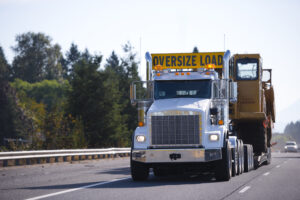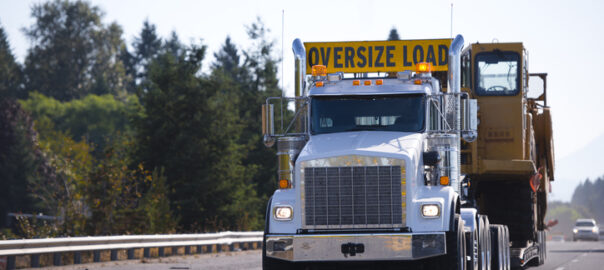In most states, roads and highways have weight limits for portions of the roadway. Loads that exceed the weight limit are known as oversized loads or overweight loads. Roadways also have a load per axle weight limit. If the load is over the load per axle weight but not the overall weight, it is still considered an oversized load. Many loads would be considered an oversized load, including:
- Construction machines
- Pre-built homes
- Containers
- Construction elements
- Wind turbine propellers

Regulations by State Laws Vary for Oversized Loads
All oversized or overweight loads must use banner signs, safety flags, escort vehicles, and wide-load and oversized-load banners. The legal dimensions and weight can vary from state to state. Vehicles that exceed the states’ dimensions must obtain a special oversized load permit to travel legally. These permits cost an extra fee and have set routes and times in which the vehicle can travel.
Permits are not sold at the federal level; instead, they are sold separately from state to state. If you are traveling through more than one state, you would need to purchase a permit through each state you will be driving through.
Federal maximum weights
Along with state laws for oversized and overweight loads, there is a federal mandate for maximum weights. These include 80,000-pound gross vehicle weight, 20,000-pound single axle weight, and 34,000-pound tandem axle weight. Federal weight compliance also takes into consideration axle spacing. The number of axles and the axles’ spacing carrying the vehicle load is important to protect bridges.
Oversized and overweight loads take a toll on the roads, but they also pose a higher risk of danger when traveling. Accidents associated with oversized loads happen for several reasons, including:
- The weight of the truck shifts to the rear, making it difficult to control the vehicle’s movement and speed
- Truck tires blow out more frequently
- Higher center of gravity, increasing the likelihood of rollovers
Since there are these higher risks, the penalties are greater for oversized and overweight loads. New penalties for single-weight violations came into effect in September 2013. These weight violations include a gross weight of 10,000 pounds over the legal limit, ranging from $500 to $1,000 for first-time offenses.
A sliding scale is used on vehicles over the legal limit, but no more than 10,000 pounds. However, when repeat offenses occur, the fines are doubled. If the load is unpermitted, fines will be assessed to the trucking company.


